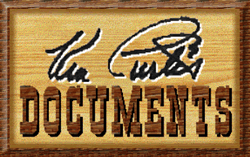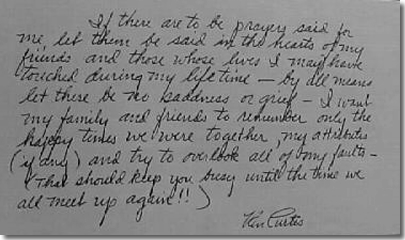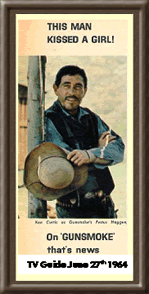|



Text
Only
|

Ken
Curtis' Farewell Note
1991
If there are to be prayers
said for me, let them be said in the hearts of my friends
and those whose lives I may have touched during my lifetime
- by all means let there be no sadness or grief - I want
my family and friends to remember only the happy times
we were together, my attributes (if any) and try to overlook
all of my faults - (That should keep you busy until the
time we all meet up again!!)
Ken Curtis
|
|
Los Angeles Time Obituary
(Plain Text):
April 29th 1991
Ken Curtis, who as a boy
helped out in his father’s jail in Colorado and as
a character named Festus Haggen performed similar work for
Marshall Matt Dillon in “Gunsmoke” is dead.
Film producer A.C. Lyles
said yesterday that his friend was 74 when he was found
dead by his wife in their home near Fresno, Calif., Sunday.
The onetime big-band vocalist had been in apparent good
health, Lyles said, attending a rodeo in nearby Clovis Saturday.
The cause of death has not be determined.
Born Curtis Gates in Bent
County, in the dry lands of Colorado where his father was
Sheriff, he worked on the family ranch and at the town jail
and studied saxophone in high school.
He came to Los Angeles in
1938 and became a staff singer on NBC Radio, where he was
heard by composer Johnny Mercer and singer Jo Stafford.
He did infantry service
in World War II, and then, after he was heard singing “Tumbling
Tumbleweeds,” Columbia Pictures converted him into
a singing cowboy. He appeared in a series of low-budget
westerns with Guinn “Big Boy” Williams.
He then joined the singing
group Sons of the Pioneers. Director John Ford hired those
vocalizing cowboys for the soundtrack of his 1950 “Wagonmaster”
and Mr. Curtis afterward became a stock player with Ward
Bond, Ben Johnson and Harry Carey in the legendary Ford
Production Company.
Mr. Curtis – who’s
first wife was Ford’s daughter Barbara –soon began
appearing on television programs, including “Have Gun
Will Travel,” “Rawhide” and “Gunsmoke.”
His seedy, drawling, unwashed
Gunsmoke character with the squinty eyes and drooping hat
became so beloved that when Dennis Weaver left the role
of Chester Goode in 1964, Mr. Curtis signed on as his replacement
for the remaining 11 years of what proved the most enduring
Western series in TV history.
|
Jan 26 –
1971
Dear friend Bob,
Thank you for your very
nice letter and your very generous praise regarding my
portrayal of Festus. To try to summarize my approach to
a character – upon reading the character’s function
and involvement in a script, I try to figure every characteristic
of the person – his general attitude towards life,
his walk, his tastes, his manner of speech, his faults
and his attributes.
My portrayal of Festus
is quite simple for me, since I patterned him after several
people I have known during my lifetime – you to,
I’m sure have a well of memories to draw from –
don’t hesitate to use them in building your character.
In my opinion it’s
an actors duty to walk into the first rehearsal with a
well defined character – then it’s up to the
director to shade or change the character to fit into
the overall picture or play.
Hope this will help you
some Bob and I wish you the very best in your career.
Your Friend,
Ken ‘Festus’ Curtis
|
| Standard Note Plain Text:
Dear Hazel,
I hope the enclosed photo
fills your request and that this note finds you in best
of health and spirits.
If you can find no better use for it, I guarantee this picture
will be most effective in scarin’ stray varmints away
from your trash-can!!
Sincerely,
Ken Curtis – “Festus”
|
 |
Nineteen
hundred years ago, give or take a year or two, around 60
A.D., a Roman named Festus was for a brief time procurator
of Judea, and, according to the historian Josephus, the
people rioted because of a decision he made favoring the
Syrians at Caesarea. Today there is violent public reaction
to another Festus – the replacement for the seemingly
irreplaceable Chester in CBS’s Gunsmoke, a shaggy character
named Festus Haggen, played by a former crooner, singing
cowboy, movie bit player and parachuting TV hero named Ken
Curtis.
The producer of Gunsmoke, Norman MacDonnell, says, “The
mail on Festus is either absolutely white or absolutely
black. Some people say they can’t stand him.
|
|
Others
say they like him better than Chester. They either love
him or they hate him – but 90 percent say they love
him.”
There is no question of the reaction to Festus in Gunsmoke’s
Dodge City. They love him there – 100 percent. The
rest of the cast had become resentful of the attitude of
Dennis Weaver, who played Chester. “Why, on his last
show, he hardly even limped!” says Amanda Blake, who
plays Kitty.
As for Festus himself, where Dennis Weaver said, “After
nine years as Chester, I have exhausted all the areas of
creativity,” the 48 year old Curtis who has been around
show business since 1939, says, “There are so many
good actors that are hurtin’, I’m just grateful.
I hope Gunsmoke goes on for another 10 years.”
The character was not calculatedly created as a replacement
for Chester. Twice Curtis did a similar role in Have Gun
– Will Travel, where under the name of Monk he became
involved with “Mr. Pala-dine.” Festus Haggen made
his first appearance in Gunsmoke in December 1962 in a script
by writer Les Crutchfield entitled “Us Haggens.”
It was supposed to be only a one-shot , but according to
MacDonnell, “He had charm. Later we had him do another
and liked him even better.” When Weaver left Gunsmoke
to do his own series, Kentucky Jones, on NBC, Festus was
moved into the gap.
Although the basic bumpkin humor of Chester and Festus is
similar, the characters differ widely. Festus can be “cold
and deadly,” says MacDonnell. In one Gunsmoke episode,
he killed a man in cold blood for assaulting his cousin.
Festus has also been seen kissing a girl, something which
would have been unthinkable for Chester – and which,
as someone close to the program points out, “is closer
than Matt Dillon has gotten to Kitty in 10 years.”
Festus and Chester are probably most alike in their speech.
Ken Curtis picked up the accent –which rarely slips
into his off-screen speech– as a boy in the dry-lands
of southeastern Colorado, where he was born Curtis Gates
in a two room prairie cabin on July 2nd 1916. His father
was a homesteader and for a time sheriff of Las Animas,
Colorado. The family lived in the jail then, and at 10 young
Curtis was substitute jailer when his father was out of
town.
Ken Curtis’ off-screen life today belies this bucolic
background. He and his wife, the former Barbara Ford, daughter
of famed movie director John Ford, live at exclusive Toluca
Lake. Ken wears heavy shell-rimmed glasses, tailored jackets
and slacks, diamond cuff links, alligator shoes, and he
drives a thunderbird.
Only the scraggly beard is a clue to the part he plays.
He’s 6 feet tall and weighs 180 pounds.
He wanted to be a doctor, but he was so successful as a
songwriter in student productions at Colorado College that
he left school and headed for Hollywood. There, in 1939,
he was assigned as a staff singer for NBC Radio. Later,
after a few misadventures, including a stint as a sandhog,
he sang briefly with the late Tommy Dorsey, who changed
his name from Curtis gates to Ken Curtis. Then, before enlisting
in the Army in 1943, he sang with Shep Fields’ band.
After the war he returned to Hollywood. His singing of “Tumbling
Tumbleweeds” on a radio program with Johnny Mercer
got him the co-starring role in a series of Westerns of
which he says, “I’d stop in the middle of a gun
fight and sing a song.”
From 1947 to 1952, he was a member of the Sons of the Pioneers,
a western singing group. It was at this time that he met
the girl who was to become his wife. She was then an assistant
film editor on one of her father’s pictures, “Wagonmaster,”
for which the Sons of the Pioneers sang the musical score.
A small part in a later John Ford picture, “The Searchers,”
brought into being the character now known as Festus Haggen.
Ken’s part was supposed to be a serious one: “I
was to be kind of a Ralph Bellamy, but I was kidding around
on the set, doing the dry-land dialect. I didn’t even
know Mr. Ford was listening. Then when it came time for
me to do my lines, he said, 'How would you say that in dry-land?'
I did it for him and he said, 'Play it that way.'”
Ken Curtis does not take himself or Festus Haggen too seriously.
Concerning acting, he says, “We’re just doing
a job, like a bookkeeper in a bank, except people watch
us.”
Three times Chester has limped ostensibly for the last time
down the dusty street of Dodge City and twice he has come
back when other plans for Dennis Weaver failed to materialize.
But if Weaver’s new series should prove unsuccessful
and he tries returning to Gunsmoke once again, he will find
the corral locked, the welcome mat gone. Festus Haggen is
there to stay.
|
|
From The Fresno
Bee
May 21, 2003
Heading West
Clovis restrooms spur move of cowboy statue, but higher
profile seems to click.
By Marc Benjamin Edition: FINAL Section: LOCAL NEWS Page:
B1
Almost 30 years
after the television career of Gunsmoke deputy marshal Festus
Haggen concluded, the character still has not galloped into
the sunset.
Just across
the street.
This month,
a statue of Festus – the character created by former
Fresno County resident Ken Curtis – was moved from
the rear of Clovis Big Dry Creek Museum to the front entrance
of the Educational Employees Credit Union.
The higher-profile
location didn't require an agent or publicist.
It was a greater purpose: nature's call. Moving the statue
will create space for new downtown Clovis restrooms. “The
option we had was to build [restrooms] back there, and the
question was what could be done with Festus?" said
Willy Barnes, Educational Employees Credit Union branch
manager and a downtown business group board member who has
been working on the statue relocation for 18 months.
The restrooms
will be built in an area on the south side of the museum,
which sits at Fourth Street and Pollasky Avenue.
Work will begin
this summer and be finished by late fall, said Sharon Jackson,
Business Organization of Old Town's executive director.
“It's something we have wanted for a very, very long
time,” she said. “I have been working on it for
seven years, and they were working on getting restrooms
before I was here.”
The bonus,
Jackson said: Festus is more visible and likely will become
the subject of tourists' photographs.
Barnes said,
“It's amazing how much interest it's sparked from people
using the ATM [automated teller machine]. People have noticed
him.”
The credit
union paid the roughly $2,000 expense to move the 900-pound
statue. “It didn't take 15 minutes,” said Jeff
Webb of Target Construction, the company that moved Festus
200 feet to the southwest. “I tell everyone he's guarding
the bank.”
The statue
was donated to the city by local sculptor Samantha Cowen
in 1991 and unveiled in February 1992.
The Festus
character was portrayed by Ken Curtis, an actor cast in
several western movies, including How The West Was Won.
He died in 1991 at age 74 at his home south of Clovis.
Festus was
a character born during an appearance as "Monk"
in "Have Gun Will Travel." Curtis joined the cast
of "Gunsmoke" in 1963 and played Festus until
the series ended in 1975.
Curtis moved
to rural Fresno with his wife, Torrie, in 1980. In his words,
it was to “get away from Los Angeles.” Curtis
was a World War II veteran who was a rodeo cowboy, a pre-med
student in college, a singer with Tommy Dorsey and a movie
and television actor.
“Ken 'Festus'
Curtis embodies all the wonderful attributes held by our
Clovis citizens and even more,” said Clovis historian
Ron Sundquist. “He is the symbol of a great hero so
needed by everyone young and old.”
The day before
his death, April 29, 1991, Curtis rode in the car of Clovis
Rodeo grand marshal Martin Mouliot, a longtime friend.
The life of
the statue that memorializes Curtis' most famous character
has not been without its saddle sores. In 1992, only two
weeks after Festus was placed, the statue had its legs severed
and his neck and arm cracked.
In 2000, the statue was defaced with eggs, toilet paper,
mustard and paint balls before being rolled off its base.
For those who
may have any notions
about additional cowboy cruelty, Webb has a warning: “This
time, he's bolted down.”
The reporter
can be reached at mbenjamin@fresnobee.com or 441-6166.
Copyright (c)
2003 The Fresno Bee
Record Number: 0415799186
|


|
|